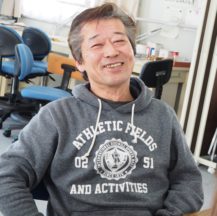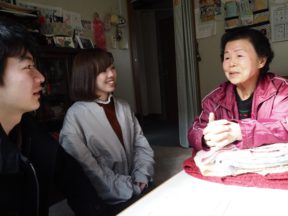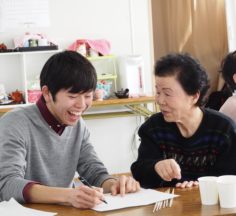March 11, 2018 marks the 7th anniversary of Great East Japan Earthquake. Habitat Japan began supporting Iwate and Miyagi prefectures immediately after the earthquake disaster through 2015. Students from Habitat Japan’s campus chapters across the country continue to visit the Tohoku region in an effort to continue its volunteer and share knowledge about the earthquake disaster to its younger generations. A campus chapter at Tohoku University in Sendai, Miyagi has been regularly visiting and supporting the community at Omori temporary housing (Omori Temp). Omori Temp is a relatively large-scale temporary housing within Ishimaki city which consists of four housing complexes. However, with its upcoming closure in August 2018, only a dozen or so households currently reside in the complex. The complex’s community association is also scheduled to end its activities in March. We will continue to support the community by understanding the current needs through networking and communication with the residents.
 Mr. Oide, who is the chair of Omori Temp community association, is one of the residents who supports our student activities and has warmly welcomed the students’ ideas. Mr. Oide explains, “to avoid isolation of temporary housing residents, we’ve proactively welcomed volunteers and periodically organized resident gatherings. However, getting the residents bought in on the community association’s activities has been a challenge, given that the residents come from various backgrounds with many being emotionally unstable from the earthquake disaster.” For example, some people complained about the community association’s use of money without understanding that financial aids were sought for its
Mr. Oide, who is the chair of Omori Temp community association, is one of the residents who supports our student activities and has warmly welcomed the students’ ideas. Mr. Oide explains, “to avoid isolation of temporary housing residents, we’ve proactively welcomed volunteers and periodically organized resident gatherings. However, getting the residents bought in on the community association’s activities has been a challenge, given that the residents come from various backgrounds with many being emotionally unstable from the earthquake disaster.” For example, some people complained about the community association’s use of money without understanding that financial aids were sought for its
activities. Mr. Oide continues, “we need the help of volunteers. Residents need to show gratitude toward volunteers who travel long distance to help us. Volunteers need to show gratitude toward residents who welcome them. You need gratitude going in both directions in order to develop a long-lasting and positive relationship.” Student volunteers nodded strongly to the words of Mr. Oide.
 Students visited Ms. Minei, a temporary housing resident whose husband passed 3 years ago and now lives alone. She tells the students to “be rational.” Ms. Minei continues, “people who evacuated from various districts moved into Omori Temp and we had to build a community from scratch. Initially, a lot of people said bad things about each other...” Being disaster-stricken and required to live in temporary housing, what Ms. Minei had to go through must have been immense. However, she was determined to “never bad-mouth others” and “live according to own beliefs”. Ms. Minei’s words strongly resonated with the students.
Students visited Ms. Minei, a temporary housing resident whose husband passed 3 years ago and now lives alone. She tells the students to “be rational.” Ms. Minei continues, “people who evacuated from various districts moved into Omori Temp and we had to build a community from scratch. Initially, a lot of people said bad things about each other...” Being disaster-stricken and required to live in temporary housing, what Ms. Minei had to go through must have been immense. However, she was determined to “never bad-mouth others” and “live according to own beliefs”. Ms. Minei’s words strongly resonated with the students.
 7 years have passed since the Great East Japan earthquake. Temporary housing complexes are gradually closing as people move out into public housing and new homes. While these moves are a reflection of earthquake disaster reconstruction making its progress, community development continues to be a challenge as residents are continuously having to adapt to new living environments. Kenta Nabatame, who participated as a volunteer, explains that the nature of volunteer activities also evolve with the progress of reconstruction but there remains a lot of work that needs to be and can be done. “Volunteering at Omori Temp made me think about the fundamentals of volunteer. I was told repeatedly to “do what is in the best interest of others”, “be rational”, and “don’t forget to show gratitude”. I think these words all describe the fundamental essence of volunteerism. These are what inherently reside in everyone’s hearts but also easy to overlook. Today’s Tohoku region reminds us of these important elements. As a volunteer, I felt that we need to go beyond what’s typically considered a good deed and genuinely do what is in the interest of others.” Campus chapter students will continue to volunteer in Tohoku to “do what is in the best interest of others.”
7 years have passed since the Great East Japan earthquake. Temporary housing complexes are gradually closing as people move out into public housing and new homes. While these moves are a reflection of earthquake disaster reconstruction making its progress, community development continues to be a challenge as residents are continuously having to adapt to new living environments. Kenta Nabatame, who participated as a volunteer, explains that the nature of volunteer activities also evolve with the progress of reconstruction but there remains a lot of work that needs to be and can be done. “Volunteering at Omori Temp made me think about the fundamentals of volunteer. I was told repeatedly to “do what is in the best interest of others”, “be rational”, and “don’t forget to show gratitude”. I think these words all describe the fundamental essence of volunteerism. These are what inherently reside in everyone’s hearts but also easy to overlook. Today’s Tohoku region reminds us of these important elements. As a volunteer, I felt that we need to go beyond what’s typically considered a good deed and genuinely do what is in the interest of others.” Campus chapter students will continue to volunteer in Tohoku to “do what is in the best interest of others.”
